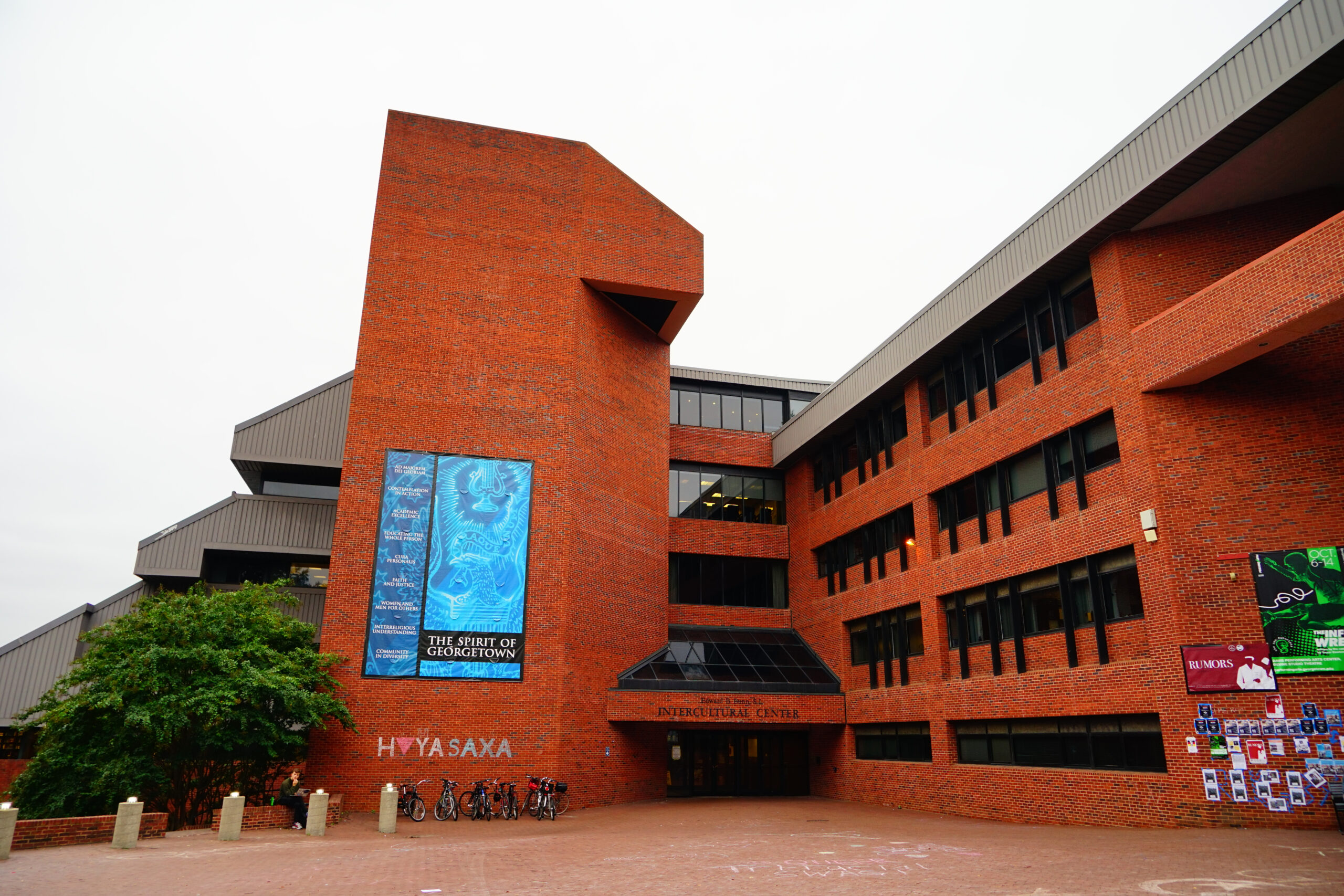This story is part of our monthly series, Campus Dispatch. Read the rest of the stories in the series here.
During the first week of the fall semester, Georgetown University students, mostly freshmen, buzz around Copley Lawn, one of the main lawns on campus, chatting with representatives of hundreds of student organizations that set up tables hoping to add new members. Some organizations, however, are relegated to Red Square, the red-brick plaza designated a “public square” on campus, because they’re not “official” Georgetown student groups and therefore lack access to university benefits. Among these is one of the most well-known student groups: H*yas for Choice (HFC).
HFC was founded unofficially in 1989, and university administration recognized the organization, then called GU Choice, as a student group in 1991, with the caveat that it not engage in “the advocacy and practice of abortion.” Many conservative Catholics protested, even filing a canon lawsuit—a petition for a governing body within the church to respond to an issue or resolve a dispute, drawing upon ecclesiastical law—with the Archdiocese of Washington. In 1992, then-dean of students and current university President John DeGioia removed HFC’s recognition, citing excessive pro-choice advocacy work.
Georgetown was the first Catholic university founded in the United States, and its core values are inspired by the teachings of the Jesuit order of the Catholic Church. As such, a student organization is ineligible for benefits and university recognition if it “directly and substantially advocates positions inconsistent with Roman Catholic moral tradition,” according to the university.
After it lost university recognition, HFC began distributing condoms to students, a practice that remains core to its identity. Now, HFC doesn’t only table during the new club fair—every day, students walking through Red Square will find club members cheerily distributing condoms, lube, dental dams, and essential information about reproductive health access on campus.
As with most Catholic universities, Georgetown opposes the coverage and distribution of contraceptives, like condoms, on campus property on religious grounds; HFC reports it distributes thousands of condoms each year, and has been doing so for years.
“The root of what has held this organization together for decades … is the fact that at the end of the day, students on Georgetown’s campus don’t have access to condoms,” former HFC President Elianna Schiffrik, a 2021 graduate, told Rewire News Group.
According to Schiffrik, HFC fills a crucial reproductive and sexual health access and education gap created by the university. Because it is not recognized, HFC does not receive university support for fundraising, media relations, and advertising, unlike other campus groups that meet the requirements for access to benefits. At the same time, this is a point of pride for the organization—its mascot is the asterisk, reflecting its inability to use the “Hoyas” trademark in its name, featured in its advice column “Ask the Asterisk.”
HFC President Sydney Hudson, a sophomore, said the organization sees its unrecognized status “as an advantage that allows us to independently operate without fear of administrative pushback.”
Without university backing, HFC sets its sights on external partnerships.
“For example, we didn’t have to answer to the university when it came to innovative programs like our free emergency contraception program,” Schiffrik said.
External partnerships, such as one with Advocates for Youth’s Free the Pill initiative, allow HFC to distribute emergency contraception for free, making Georgetown one of the first universities where emergency contraception is provided in this way.
When reproductive justice clashes with universities’ ‘Catholic characters’
Although much of HFC’s on-campus activities are tacitly permitted as free speech and expression, it faces administrative hurdles due to its unrecognized status. For example, HFC has to partner with officially recognized clubs to book rooms and host events on campus.
This disconnect came to a head recently when HFC, in co-sponsoring a reproductive justice panel with a recognized student group, reserved the largest event space on campus, Gaston Hall, in December, according to former HFC board member Soraya Bata, a senior. Three business days before January 17, when the event was scheduled, a university representative moved the panel to a smaller, more secluded campus venue, citing “security options for high-profile/sensitive events,” according to an email provided to RNG.
Bata said that decision limited the number of potential attendees, and student organizers had to scramble to advertise the event with the new location.
“Georgetown Event Management Services followed its standard process for reviewing event requests and upon receiving complete event details from the host group, consulted with departments including the Center for Student Engagement and the Georgetown University Police Department (GUPD) about logistical and safety needs,” a university spokesperson told RNG by email, resulting in the decision to relocate the event. “The use of Gaston on January 17 was never confirmed.”
Within the last year, Gaston Hall has hosted events with arguably higher security risks, including a town hall-style forum with former Vice President Mike Pence and a first-of-its-kind panel of trans lawmakers and activists. Additionally, Georgetown hosts the Cardinal O’Connor Conference on Life, the largest “pro-life” conference in the country, in Gaston Hall every January. The university spokesperson did not comment regarding these events or whether HFC’s co-sponsorship had any connection to the last-minute decision to relocate the event.

At other religiously affiliated schools with smaller and less established student organizations, tensions with university administrations are more palpable. At Boston College, for example, condom distribution is relegated to a sidewalk outside of the main campus.
“We’re strongly disliked by the administration,” Alden, a junior and co-president of Students for Sexual Health (SSH), said. Alden requested a pseudonym for fear of retribution by Boston College because they work on campus.
SSH is an independent student organization dedicated to providing sexual health education and resources at Boston College, including contraceptive distribution. SSH, which has been active for about a decade, is also a chapter of Planned Parenthood Generation Action, which means it belongs to a network of other schools, including non-Catholic schools and organizations based in Boston to whom they can refer students to access services. Alden said SSH works closely with other nearby schools like Boston University, which has vending machines with emergency contraception.
But at Boston College, the administration has a conservative attitude regarding sexual health and reproductive rights, informed by its Catholic character. Sexual relations between unmarried students are in violation of the student code of conduct, which has a trickle-down effect that makes sex a relatively stigmatized topic on campus. In addition, many students come from Catholic high schools, where rigorous sex education is uncommon and often emphasizes abstinence. Alden said they conducted a survey for a class project in which they found that only half of the women who responded had had a formal sex education.
“Clubs have been suspended for trying to work with SSH,” Alden said. Even so, they said the student body response to SSH’s efforts is “overwhelmingly positive.”
This anecdote echoes general trends among Catholics in the United States, illustrating a disconnect between conservative administrations and the general public. The Pew Research Center recently found that about 61 percent of Catholic Americans believe that abortion should be legal in all or most cases, though the Catholic Church itself opposes abortion.
Money for ‘fetus graveyards,’ but not for condoms
Unlike reproductive rights groups, “pro-life” student organizations at many Catholic universities enjoy both considerable support among students and generous university funding.
“It often felt like Campus Ministry-sponsored organizations never had a shortage of funding,” 2020 Marquette University graduate Maria Bunczak Schmidt said.
Marquette has made headlines over the last decade for what some students call a “fetus graveyard,” where gendered red and blue flags fly in a “memorial for the unborn.” This polemic demonstration, held in the main quad of campus, is sponsored by the well-funded student club Marquette for Life, Schmidt said. Meanwhile, in a 2016 study, Marquette was named as the least sexually healthy university in the country.
As a student, Schmidt led Marquette’s intersectional feminist organization Empowerment, which did not receive funding from the university. She organized condom distribution efforts with friends as individual students, unaffiliated with Empowerment to avoid university sanctions.
“We didn’t necessarily want to follow all their guidelines,” Schmidt said, even if it meant spending personal funds to carry out advocacy work independently on campus. “It was a labor of love.”
Unfortunately, Empowerment dissolved in spring 2023 following the graduation of its student leaders.
“It felt like such an uphill battle,” Schmidt said. “It’s a lot of work.”
Schmidt said its students are underserved when it comes to information about reproductive health and rights.
The University of Notre Dame also has seen “fetus graveyard” demonstrations.
“Notre Dame Right to Life is one of the largest and most powerful clubs on campus,” Dane Sherman, a senior and member of Irish for Reproductive Health (I4RH), said. “They placed tiny crosses all over the main quad to represent murdered babies.”
I4RH is an independent, student-run nonprofit that works to expand sexual health education and access. Like Georgetown’s H*yas for Choice, I4RH also receives condoms and emergency contraception from Advocates for Youth, according to Sherman, and also relies on recognized student organizations to reserve campus spaces.
Given the backlash from students and administrators alike, much of I4RH’s activity has to be “under the table,” Sherman said, adding that hosting demonstrations or distributing resources on campus is difficult, despite high STI incidence rates similar to Marquette, according to the 2016 study.
Even so, I4RH has pursued external partnerships such as Americans United for Separation of Church and State, which represented I4RH in a lawsuit filed against Notre Dame for removing contraceptive services from its student health insurance in 2018. The case is currently stayed.
Promoting collaboration and moving beyond condoms
Given the challenges associated with a lack of administrative recognition and funding, it’s common for student organizations at Catholic universities to pursue partnerships with external organizations, like HFC and I4RH do with Planned Parenthood or Advocates for Youth, as well as with universities in their area with fewer restrictions surrounding reproductive health advocacy on campus.
“We routinely get communication from other universities outside the DMV inquiring about how we operate and provide resources since we are at a Catholic university,” Hudson, the H*yas for Choice president, said. “These communications are especially rewarding when they come from students at other Catholic institutions who are hoping to start similar programs to HFC.”
Even so, it can be difficult to maintain momentum, especially at smaller schools or campuses where administrators are more hostile toward organizing around reproductive health access.
“The work got more important, and more dangerous, following the Dobbs decision,” Sherman said, referring to the case that overturned Roe v. Wade nearly two years ago.
In June 2023, Indiana doubled down on its total abortion ban, curtailing the work that I4RH used to carry out in assisting pregnant people to abortion clinics. Despite these challenges, I4RH continues its advocacy work and collaborates with other Indiana universities.
One of HFC’s most successful tactics has been making condom distribution fun. In addition to tabling, many dorm residents serve as “condom fairies,” pinning manila folders containing condoms and lube on their doors and decorating them.
“The only hard part was actually finding a time that worked because so many people had signed up to table,” said Nickie Demakos, a 2021 Georgetown graduate who was also a condom fairy when she was a student. “It was easy and accessible to participate, especially because there were multiple avenues of participation.”
At Georgetown, HFC adopts the reproductive justice framework created by the multiracial collective SisterSong, which centers the human right to maintain bodily autonomy and to have or not have children. In this way, HFC engages a wide range of social justice issues through the lens of reproductive justice and cura personalis, the Jesuit principle of care for the whole person.
“Our work is intersectionally related to abortion and health care, not exclusively,” Hudson said.
Bata added that only talking about abortion when discussing reproductive justice “can be really alienating and unproductive.”
In the past, HFC led a protest, colloquially called the “COCC block,” outside the Conference on Life. This year, student leaders chose to direct these efforts toward education, resulting in the relocated reproductive justice panel.
At Fordham University in New York City, there is little room for nuance regarding reproductive health access, according to Sophia Grausso, a senior and president of Feminist Alliance, which organizes events for students interested in women’s and reproductive rights and coordinates volunteer efforts with similar organizations in the area.
“The majority of female peers I’ve talked to have been talked down to, belittled, or even slut shamed” when attempting to access services such as STI testing, Grausso said.
Like most Catholic schools, Fordham “follows church teachings on reproductive issues” and does not provide contraceptive services on campus, with limited exceptions. As someone with polycystic ovarian syndrome and endometriosis, Grausso said these issues are intensely personal.
“I am very passionate about using my struggle and reliance on hormone therapy specifically to shed light on the larger barriers to abortion and trans health-care access,” Grausso said.
Although the policies against contraceptives at Catholic universities are often very cut and dry, this does not necessarily reflect the Catholic perspective writ large. I4RH, for example, partners with Catholics for Choice, an organization that represents the “majority of Catholics who believe in reproductive freedom.”
Similarly, for HFC, religious groups have been a welcome source of allyship.
Bata said the group’s status “forces us to figure out how to find allies where you don’t expect them. In a lot of progressive circles, people will conflate religion and conservative values, but that’s not the case.”
This post is auto-grabbed with the software. The copyright belongs to Source link




